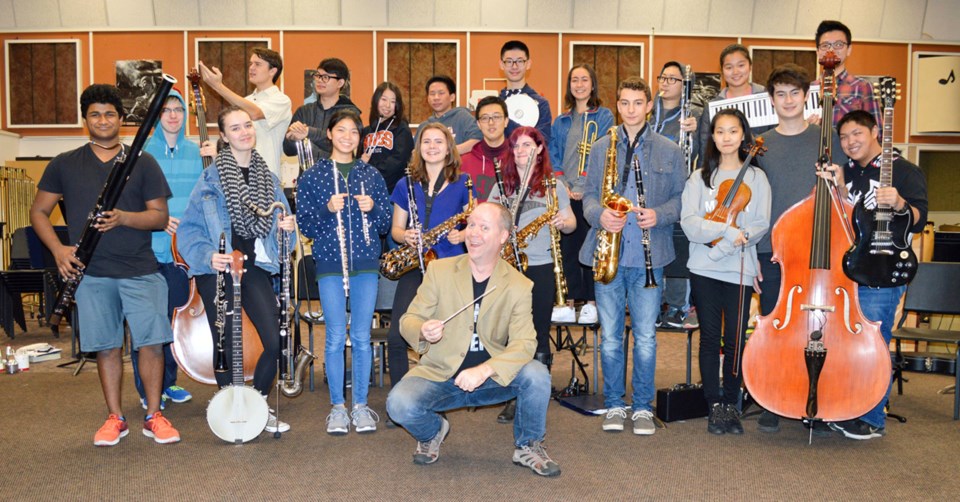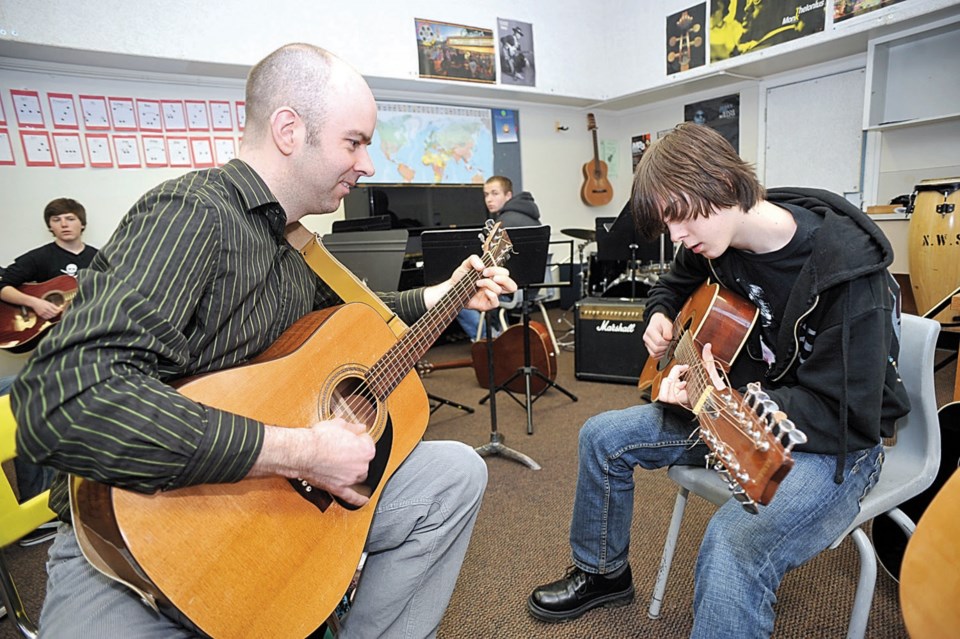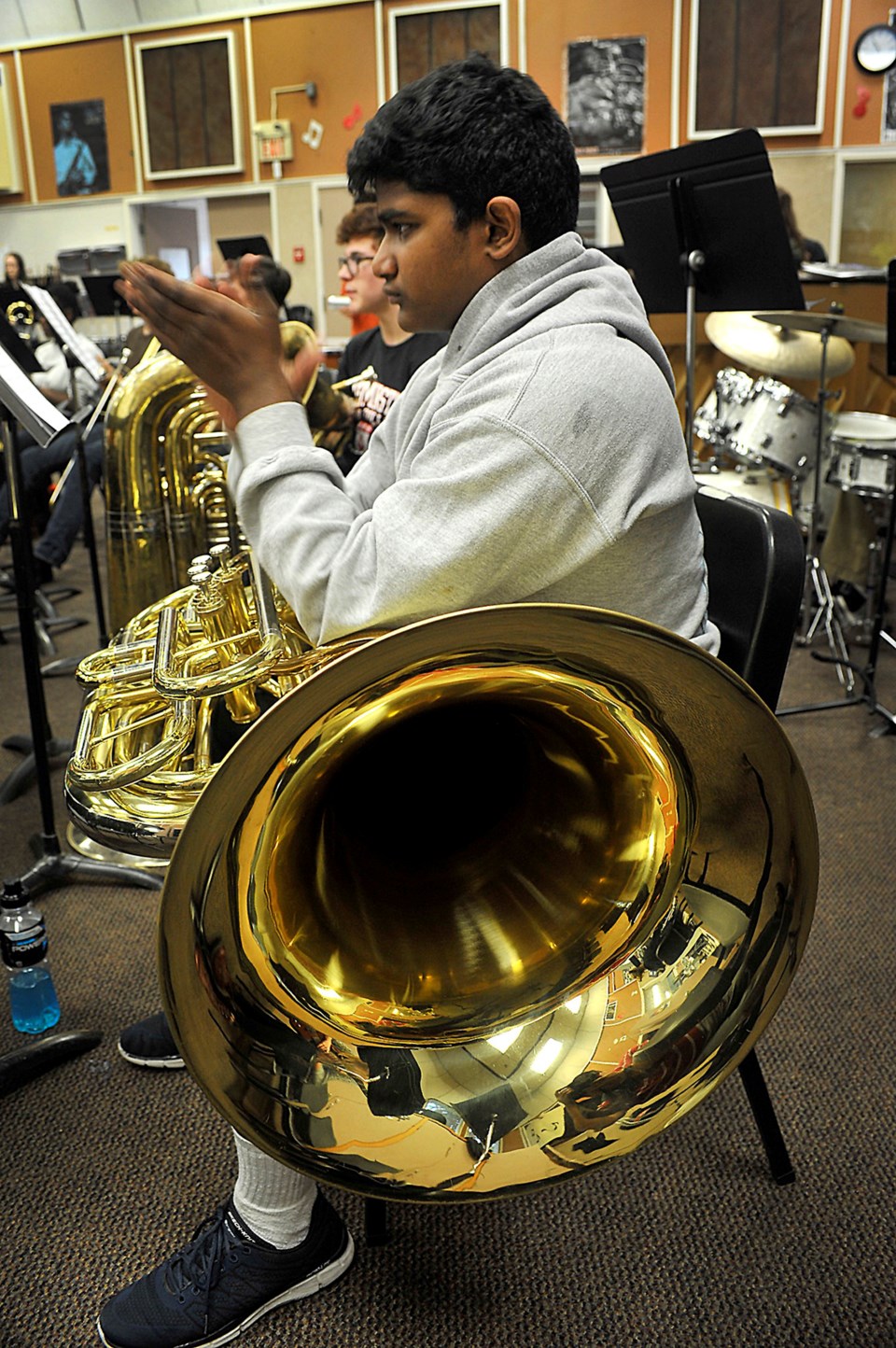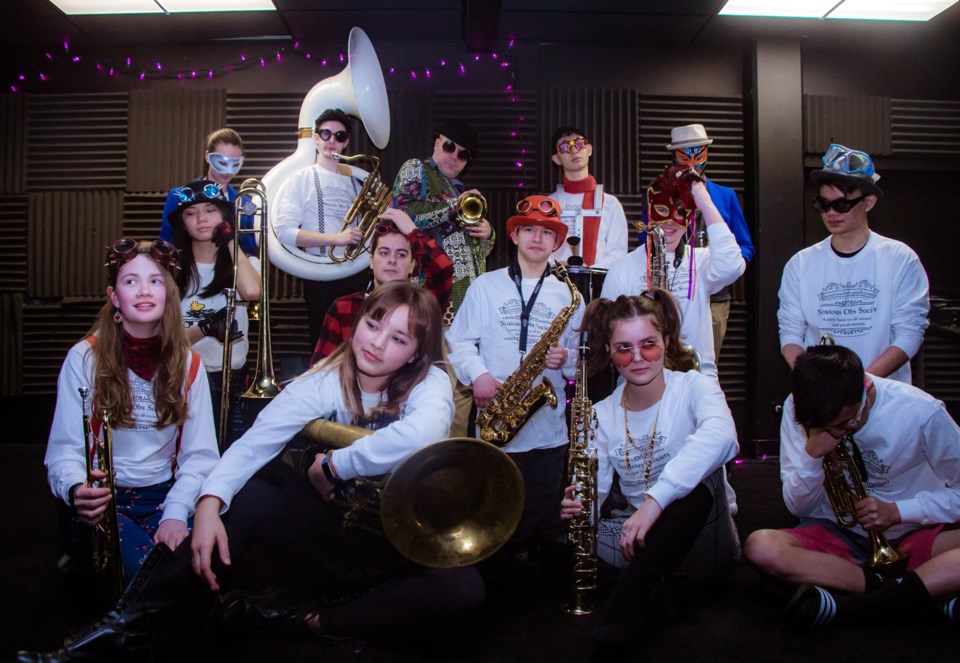It’s lunch hour, and there are no classes going on.
But the music rooms at New Westminster Secondary School are still alive with activity. There’s a group of kids in one room hanging out; a few others practising; still others just playing around with their instruments. There’s a warm buzz of conversation and plenty of laughter.
This space is safe. Welcoming. Inclusive. This space is what music teachers Steve Clements and Kelly Proznick have helped to build. And this is what they find themselves now fighting to save.
“The situation is such that we feel music is not supported in the schools,” said Clements, who leads the school’s concert and jazz bands. “It’s not really a tenable situation to continue like this. We need support, and it needs to be long-term support.”
Proznick, the department head for fine and performing arts, leads the school’s choir and vocal jazz programs. It’s reached the point, she said, that despite their best efforts, the school’s music teachers are forced to watch the programs they have worked so hard to build being eroded.
“It’s devastating to see it all kind of disintegrating,” she said.
TAKING A STAND
The plight of music education in the New Westminster school district isn’t new. The challenges it faces – largely around funding and scheduling – have been years in the making.
The issue was thrust into the spotlight after a group of parents and supporters decided enough was enough and took their case to the school board at its Feb. 26 meeting.

Wendy Cooper, co-treasurer of the NWSS Music Auxiliary, led the delegation with a formal presentation to the board. In a followup interview with the Record, Cooper said the impetus for acting now was one of those small things that turned into “a huge snowball effect.” Her son – who plays trumpet in the NWSS band program – mentioned that all of his friends won’t be in band next year because they’re in the international baccalaureate program, and the IB scheduling doesn’t allow time for music.
That didn’t sit well with Cooper, who knows how important her son’s group of friends is to his high school experience.
“All of his closest friends are in band, the ones he’s known since Grade 1; they’re all a really tight crew,” she said. “That’s his family. Those are the people who know him the best, and they create music together. That is so powerful.”
And it wasn’t just about her son.
It was about all those kids who couldn’t fit band into their schedule anymore. It was about the fact that the loss of IB students means fewer kids for the NWSS band programs, year over year, which in turn means loss of funding.
Even more fundamentally, it was about the fact that kids, all kids, deserve the chance to experience all the benefits music education has to offer - and that’s no longer happening in New Westminster.
THE EARLY YEARS
The challenges with music don’t start at the secondary school level. Middle school music programs are feeling the pinch – and if fewer students get access to music at middle school, fewer will pursue it to high school.
Cooper said students at New West’s middle schools are facing a space crunch because classes don’t always have enough room for all the kids who want to take music.
“There are kids that are turned away because there’s not enough to make a second class,” she said.
Parent Jen Arbo, whose son is now in Grade 5, wrote a letter to the board telling them about her own situation. Her son started learning trumpet more than a year ago because the family was able to borrow a trumpet and get him private lessons.
Now they’ve learned that at his catchment middle school, Glenbrook, band instruction might not be available to all students – French immersion students have greater access to band than English students because of scheduling – and that band is only available for grades 7 and 8.

“To think the exposure to musical education will end as my son enters middle school is heartbreaking,” she wrote.
Peter Zaenker, music teacher at Glenbrook Middle School, told the board about the challenges he faces coordinating the school’s band program, teaching general music and also adding in computers and tech ed. Last year, he said, was his most challenging year in 12 years of teaching.
The complexities of the structure have made it hard to even have a band program at Glenbrook, he said, noting scheduling issues mean that students now only have band for half a year instead of a full year - and one Grade 8 class gets music only once every two weeks. Compounding the problem is the unequal access to band between the English and French immersion streams at Glenbrook.
“I have basically no support because I’m trying to just keep things afloat,” Zaenker told the board.
“There needs to be some kind of a reset button and some kind of master plan, some assistance from outside. It’s very hard for one person to do it on my own.”
NO VISION
Therein lies the problem, for Clements and Proznick: there’s no vision and no master plan for music education at a district-wide level.
“There’s no model, or policy, or plan, for delivery of arts education in the district,” Proznick added, noting there are district facilitators in areas such as literacy, numeracy, technology and French, but no such person for the arts. “There’s a lack of structure and policy around arts education.”
That means music education has become a “hodgepodge,” with different schools taking different approaches depending on the priorities of the principal in question.
A rising focus on ADST (applied design, skills and technology) as part of the new B.C. curriculum has meant increased pressure on school district funding – to provide laptops for students, for example.
“That’s a big chunk of money that never used to be a priority,” Clements pointed out.
What hasn’t been prioritized in the same way, they say, is the arts.
Clements is the first to admit that music, and in particular instrumental music, isn’t cheap. The cost of providing instruments and keeping them in good working order isn’t a small one.
The money available to run the program has been shrinking. When he first started at NWSS 18 years ago, Clements said, the department’s budget was five to six times higher than it is now.
“The concern is always money. Money, money, money,” he said. “Changes are always being made to save money.”
Proznick noted the school district used to cover things like venue rental – primarily use of the Massey Theatre – and instrument repairs. Now the music program has to cover those costs itself.
It’s fallen upon the school’s music auxiliary – a group of largely parent volunteers – to raise funds to offset the costs that aren’t covered by the school district. The group started up its major fundraiser, the bandathon, in 2010 with a primary goal of raising money to ensure every music student could take part in band tours. NWSS students have toured to locations such as Whistler, Victoria, Banff and Cuba in recent years, and bandathon funds have helped to ensure students in need wouldn’t be left behind.
“We’re still managing to never turn away a family, ever,” Proznick said.
But the money needs to stretch even further these days – to cover not just instrument purchases but basic needs, like reeds for woodwind instruments and repairs to shared instruments. And with school-owned instruments being used day-in, day-out by students in multiple classes, repairs are an ongoing challenge. In fact, of three tubas owned by the school, only one is currently in working order. The other two are sitting idle waiting for the money to be found, somehow, to get repairs done.
And, Clements said, it’s becoming an increasing challenge to raise interest from the community at large for the school’s fundraising efforts when so many groups are in need of help.
“It’s getting harder and harder to go out into the community and ask for money,” he said. “It’s kind of sad to be cap in hand.”
THE PRIVILEGE GAP
What worries supporters of school music programs is the danger of an increasing gap between the privileged and those who are less so.
JJ Lee, a father of two NWSS music students and a member of the music auxiliary, spoke to the board and wrote them a letter about attending the Surrey Schools Jazz Festival held Feb. 22 and 23.
The NWSS senior jazz band made it into the showcase finals, facing off against the Kwalikum Secondary band from Vancouver Island, and winding up in second place.
“As Kwalikum’s excellent performance unfolded, I began to feel, to witness, privilege in action,” he wrote. “I could not help but think their wonderful set was founded on private lessons, access to fine and well-maintained instruments, ample practice time, either at home or on school grounds, and the full support of its school and the players’ parents.”

Though NWSS has outstanding teachers and a highly active music auxiliary, Lee said it faces some extra challenges. For instance, in one section of one of the jazz bands, he knows of only one player who lives in a family-owned home. The rest are renters.
“That has an impact on achievement when a family has to make a choice between allowing their child to practice or facing threatened or actual eviction,” he wrote.
Access to musical instruments, too, is key.
Kelly Slade-Kerr, a former school trustee and current NWSS music parent, notes her daughter is fortunate in owning her own trombone. But musical instruments are expensive – a new instrument can easily set a family back several hundred dollars or more – and Slade-Kerr says schools need to be able to provide good instruments for students whose families just can’t afford it.
“We need to have a supply of musical instruments that are owned by the music programs,” she said. “Equity is an important part of why the funding needs to be there at a district level.”
WHY MUSIC MATTERS
Fundamentally, Proznick said, the precarious situation of the district’s music programs stems from the fact that the arts is not viewed as an integral part of education – like, say, English or science.
Which saddens her because she sees the arts as being not just important, but essential.
When you talk to music students about why they’re in the various programs at NWSS, Proznick said, their answers revolve around the same themes.
“A lot of it is, they feel like it fulfils them. It’s social and emotional health, really; they feel seen and heard. Being in these courses has helped students with their wellness in a profound way.”
At a time when anxiety and stress are on the rise, and when wellness is one of the school district’s professed goals, Proznick said it just makes sense to look to the arts.
Slade-Kerr agrees. Last year, her daughter wasn’t able to register in music due to scheduling issues (she’s in French immersion, and that posed challenges with her timetable). This year, however, she was able to get music back into her schedule, although she switched to choir from band because she didn’t feel comfortable with instrumental music after missing a year.
“She suffered from serious anxiety issues last year,” Slade-Kerr said. “Now that she’s in the music programs this year, her condition has dramatically improved. I attribute much of that improvement to the fact that she’s in music this year.”
Another former NWSS music parent, Colleen Winton, reiterated that message to the school board. She spoke in support of the delegation on Feb. 26, telling trustees that her sons – who graduated in 2008 and 2011 – benefited from the music offerings at the high school.
“They found a family there,” she said.

Winton, who also took music at NWSS during her own high school years, said that in the days before the rise of gay-straight alliance clubs, music was where children who were marginalized found a home.
“When I was a kid, I felt like we had the jocks and the future librarians and all of those people all together; the cheerleaders and the science nerds were all together playing music,” she said. “And it’s still the same. Those LGBTQ kids who didn’t find their family in the hallways had a home with the jocks and the future librarians and all those people, and they had a larger family.”
That same tradition continues to this day.
“Those teachers are creating a safe space there,” she said.
Even more than that, Winton said, the NWSS teachers work to provide whatever it is the individual students need – even if it’s something that isn’t already offered, be it conducting, or composing, or playing in a string quartet.
“They recognize the individual needs of the students who come into their classrooms, whether they be educational needs, music needs – spiritual needs, really.”
“Spiritual” is a word that hits home for Cooper, too. As well as being an NWSS band parent, Cooper is also president of the Royal City Concert Band, a community band of some 50 players that welcomes people from all walks of life.
“I consider my Thursday night practice my church. It feeds my soul,” she said.
Cooper said she’ll always be grateful for what music did for her during her own school years. Raised in a rocky family situation, she went to 18 schools in 13 years and moved out at 16.
“I joined all the things I could so I wouldn’t have to go home every day,” she said. “I think, for me, if I hadn’t had band and choir, I probably would have been more of a statistic on the drug and alcohol front of things, honestly. … I don’t think I would have been a ‘good girl’ if I didn’t have that community.”
FINDING OUR HUMANITY
For Proznick, the issue is even more far-reaching than what music education can do for individual students.
It’s the fact that arts experiences help us, as human beings, to “tap into our humanity.”
“Those are participatory things that actually deal with the spirit and the heart,” she said.
“Arts practices are where we find our humanity. Why are we not paying attention to that part of learning in our schools?
“I feel like the world is in such a precarious position … politically and environmentally – if we don’t find a way to reconnect, not with technology but with ourselves and with creation, we’re going to be in more and more trouble.
“Arts is the antidote to the disconnect.”
WHERE TO BEGIN
Proznick laughs a little about sounding melodramatic about arts education saving the world.
But the reality, as she sees it, is simple: Either it’s a priority for the New Westminster school district, or it’s not.
“It is money, but it’s also just about asking the question: fundamentally, what do you believe?” she says.
Both Proznick and Clements say they’d first like to see consultation – just to hear from trustees, “We hear you, let’s talk,” Proznick says, would mean the world to them.
“There’s a limited amount of money, and everybody wants it, and they have to make decisions, but at least make an informed decision,” she said. “I don’t think they understand how much of a struggle it’s become for us.”
Proznick is “cautiously optimistic” about their chances, pointing out arts education was a talked-about issue during the recent municipal election campaign.
In a perfect world, the teachers would love to see a district-wide policy on arts education, and a person to coordinate such a policy.
Clements stresses, though, that nothing will work without funding.
“I would just love for the district to say, ‘For every dollar you fundraise, we will match it,’” he said.
Cooper’s presentation to the board made four specific suggestions: to put all-year band back into all middle schools; to include music in the IB programming after Grade 10; to increase funding to music programs to cover venue rental, instrument repairs, supplies and bus trips; and to work with venues and the city to bring down the cost of venue rental for school groups.
From where Slade-Kerr sits, now is a good time for the music programs to be asking for help.
She noted the school board is currently going through its budget process and there’s time for funding to be put in place for 2019/20, if the board is so inclined.
“There were significant cuts in the district several years ago to deal with the deficits,” she said. “The district is now in the position where they have a surplus, and it is possible for the board to allocate part of that surplus to additional funding.”
Any changes in funding, she said, need to start with a change of mindset.
“In my view, the board needs to issue a very strong, principled statement about the importance of arts education in our system. They need to make it clear to all levels of the system that fine arts is a crucial and integral part of the system,” Slade-Kerr said. “Once you have that message from the top down, there will be a trickledown effect into the system.”
As to whether any change will happen, Slade-Kerr noted the board will have to weigh all the district’s needs before deciding how much, if any, of its surplus it can allocate to music.
But she, too, says she’s optimistic.
“In my view, the current board, we had them at hello in terms of fine arts, and they are motivated to find a way to move this forward.”
*
MAKE A DONATION
Want to help? The New Westminster Secondary School music department accepts donations of all kind year-round – used instruments, cash or cheque. You can also donate via Paypal online through www.nwssmusic.com.



